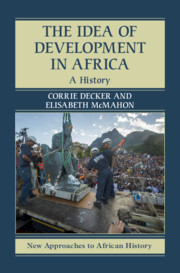Book contents
- The Idea of Development in Africa
- New Approaches to African History
- The Idea of Development in Africa
- Copyright page
- Contents
- Figures
- Tables
- Maps
- Boxes
- Acknowledgments
- Maps
- Introduction
- Part I Origins of the Development Episteme
- Part II Implementation of the Development Episteme
- Part III “Problems” in the Development Episteme
- Chapter 9 Reshaping Huts and Homes
- Chapter 10 Lessons in Separate Development
- Chapter 11 Capitalizing on Dis-ease
- Chapter 12 Manufacturing Modernization
- Epilogue
- Bibliography
- Index
- References
Chapter 11 - Capitalizing on Dis-ease
from Part III - “Problems” in the Development Episteme
Published online by Cambridge University Press: 16 October 2020
- The Idea of Development in Africa
- New Approaches to African History
- The Idea of Development in Africa
- Copyright page
- Contents
- Figures
- Tables
- Maps
- Boxes
- Acknowledgments
- Maps
- Introduction
- Part I Origins of the Development Episteme
- Part II Implementation of the Development Episteme
- Part III “Problems” in the Development Episteme
- Chapter 9 Reshaping Huts and Homes
- Chapter 10 Lessons in Separate Development
- Chapter 11 Capitalizing on Dis-ease
- Chapter 12 Manufacturing Modernization
- Epilogue
- Bibliography
- Index
- References
Summary
This chapter traces the imperial history of racial and environmental medical research, the economic drivers behind public health initiatives, and the legacies of colonialism in medical research and public health interventions in Africa. Examining this history of African encounters with development interventions around health provides much-needed context for breaking down misconceptions about African resistance to or ignorance of Western biomedical aid. The development episteme has perpetuated the idea that Africa is a place of disease and that Africans are resistant to treatments and cures. The nineteenth-century ad hoc campaigns to protect Europeans and segregate the sick from the healthy grew into state-sponsored public health programs during the interwar period. By World War II colonial development discourses on African health had shifted from the “white man’s grave” to biopower as states harnessed healthy bodies for productive purposes. Medical studies on declining populations, outbreaks of sleeping sickness or tuberculosis, STIs, and maternity and childcare sought healthcare solutions that would increase the productivity of labor. New hospitals, maternity centers, child welfare centers, and dispensaries brought some people relief and others terror. Scientists and officials used public health interventions and biomedical research to bolster the norms of the development episteme.
Keywords
- Type
- Chapter
- Information
- The Idea of Development in AfricaA History, pp. 230 - 251Publisher: Cambridge University PressPrint publication year: 2020

